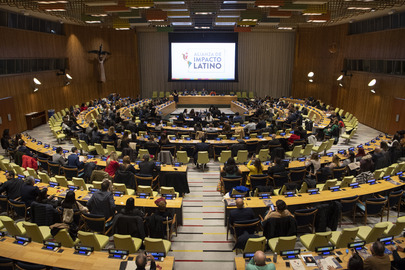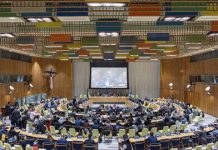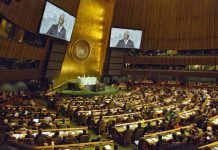DR Congo sees dramatic increase in sexual violence linked to conflict, funding cuts
Violence in the eastern Democratic Republic of the Congo is having a devastating impact on communities and especially women and girls.
According to the UN Population Fund (UNFPA), at least 32 pregnant women were injured and three died from gunfire or shrapnel in the first four months of this year.
UNFPA also reported that sexual violence in eastern DR Congo is at “unprecedented” levels, with hundreds of cases reported each week, caused by ongoing violence linked to advances by Rwanda-backed M23 rebels.
Efforts to help most survivors of sexual violence have been hampered by a severe shortage of post-rape kits, with only seven of North Kivu’s 34 health zones holding minimal stocks, the UN agency said.
UNFPA noted that recent US defunding has resulted in a 37 per cent reduction of support for protection services and cuts of over 50 per cent to sexual and reproductive health work.
The health system in eastern DR Congo is now “on the brink of collapse”, the UN agency maintained.
Ukraine: With no end to war in sight, UN launches $277 million winter appeal
In Ukraine, a Russian strike on the eastern town of Dobropillia has claimed more civilian lives and devastated public and private infrastructure, UN aid teams reported on Thursday.
According to the UN aid coordination office, OCHA, the attack hit a residential area in the town, damaging a shopping centre, market stalls and hundreds of apartments.
With no end to the war in sight, OCHA announced plans to help the people of Ukraine prepare for the coming winter, in an appeal for $277 million.
It will make it possible to help 1.7 million of Ukraine’s most vulnerable people from this October to next March.
Meanwhile, the UN aid agency and local partners have continued to support families affected by intensifying Russian attacks in Ukraine’s Zaporizhzhia, Donetsk and Kryvyi Rih.
Peru: Rights experts’ concern over atrocity crimes amnesty
To Peru, where top independent rights experts have voiced concern over the planned amnesty for people responsible for crimes, including mass killings during Peru’s civil war.
A bill preventing prosecution for these atrocity crimes was first approved by the country’s lawmakers last month; a permanent panel then approved it after a second reading on 9 July, when Congress was not in full session.
If enacted, the rights experts warned that the bill grants amnesty to members of the armed forces, the police, so-called self-defence committees, to State officials already prosecuted; as well as to others whose conviction is not final.
From 1980 to 2000, Peru’s brutal war left a reported more than 69,000 people dead, with a full 75 per cent coming from indigenous communities.
One of the most infamous crimes during the civil war was the armed forces’ murder of 69 unarmed indigenous Quechua villagers in 1985.
The rights experts have appealed to Peru’s executive branch of government to veto the bill and prevent it from becoming law.
Any early release of those convicted of serious human rights violations “is at odds with international human rights law”, said the experts, who are not UN staff and who work in an independent capacity.
Daniel Johnson, UN News.
Music composed and produced by Joachim Harris. All rights reserved.
Source of original article: United Nations (news.un.org). Photo credit: UN. The content of this article does not necessarily reflect the views or opinion of Global Diaspora News (www.globaldiasporanews.com).
To submit your press release: (https://www.globaldiasporanews.com/pr).
To advertise on Global Diaspora News: (www.globaldiasporanews.com/ads).
Sign up to Global Diaspora News newsletter (https://www.globaldiasporanews.com/newsletter/) to start receiving updates and opportunities directly in your email inbox for free.






























